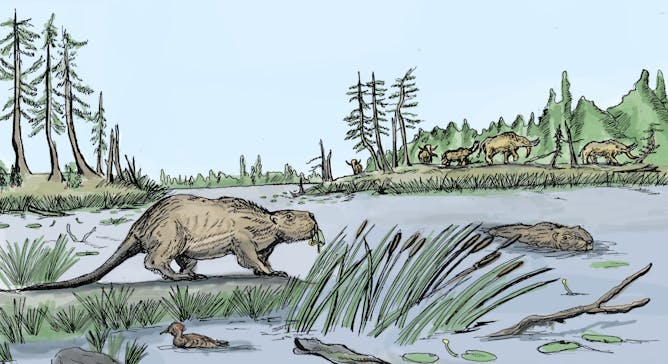|
Last weekend, I was lucky enough to spend some time at a lake. At dusk, I ventured outside to watch a beaver silently swim by the island. They are a magnificent animal and, of course, an icon of Canada. But it was only recently, during a trip to Western University, I became aware that giant, bear-sized beavers once roamed the lakes of North America. Today in The Conversation Canada, Tessa Plint tells us all about the giant beaver – and what led to its extinction 10,000 years ago.
Michael Lynk from the faculty of law at Western is also a special rapporteur for the United Nations Human Rights Council on the situation in the Palestinian territory. He looks at the problems with the recently passed Canada-Israel free trade agreement, which among other things lacks a human rights provision.
Attachment is a fundamental need for all humans. Early childhood studies expert Nikki Marty of the University of Guelph-Humber looks at the importance – and lasting impact – of early connections between infants and their caregivers.
And finally…it’s another year with no Canadian team in the Stanley Cup finals. John Bergeron of McGill University notes that Canada has also had a long dry run in another important competition – the Nobel Prize in medicine.
A correction from yesterday’s newsletter: in the story about Dead Poet’s Society, we said it was the film’s 20th anniversary. Eagle-eyed readers pointed out it came out 30 years ago.
Regards,
|

The now-extinct giant beaver once lived from Florida to Alaska. It weighed as much as 100 kilograms, roughly the same as a small black bear.
Illustrated by Luke Dickey/Western University
Tessa Plint, Western University
Scientists studied the fossilized bones of giant beavers to understand what they ate and whether the species could keep up with environmental change.
|

Reuven Rivlin, president of the state of Israel, presents Prime Minister Justin Trudeau with a gift of socks from his wife before a meeting in Chelsea, Que. in April 2019.
THE CANADIAN PRESS/Justin Tang
Michael Lynk, Western University
Treating Israeli settlements as part of Israel in the new Canada-Israel free-trade deal entangles Canada in serious violations of international human rights and humanitarian law.
|

Infants and young children need connection to thrive.
(Shutterstock)
Nikki Martyn, University of Guelph-Humber
Early experiences with our primary caregivers teach us what to expect throughout life.
|

Canadian Ralph Steinman’s investigations of dendritic cells led to a Noble Prize in physiology or medicine, but not for a Canadian institution.
Shutterstock
John Bergeron, McGill University
Only one Canadian discovery has brought home a Nobel Prize in physiology or medicine. But, like winning another Stanley Cup, Canadians should not give up hope.
|

Donner des aliments qui, autrement, seraient envoyés dans des sites d'enfouissement ne contribue guère à assurer le bien-être des Canadiens qui vivent dans l'insécurité alimentaire.
Shutterstock
Elaine Power, Queen's University, Ontario
Envoyer nos surplus alimentaires à des organismes de bienfaisances est une solution simpliste et moralement douteuse. Elle ne règle rien au problème qui cause la faim: la pauvreté.
|
Environment + Energy
|
-
Anders Sandberg, University of Oxford
An expert responds to a teenager who wants to know – is there any hope for humanity's future?
|
|
Health + Medicine
|
-
Anthony Medford, University of Southern Denmark; James W Vaupel, University of Southern Denmark; Kaare Christensen, University of Southern Denmark
Life expectancy has more than doubled in the last two centuries. How much more can it increase?
|
|
|
|